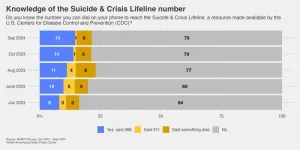(Press-News.org) Image
Highlights:
MSU researchers now can identify more proteins, or biomarkers, in blood plasma, including those linked to specific diseases like cancer.
By identifying these biomarkers earlier, medical researchers can create better diagnostic tests and drugs that target diseases sooner, improving patient outcomes.
EAST LANSING, Mich. – Medical professionals have long known that the earlier a disease is detected, the higher the chance for a better patient outcome. Now, a multidisciplinary team of Michigan State University researchers, in collaboration with experts from Karolinska Institute and the University of California, Berkeley, has pioneered a way to do just that. The new method takes a deeper look at the proteins in plasma and reveals biomarkers that enable researchers — and ultimately physicians — to detect diseases sooner.
“The ability to identify biomarkers advances medicine in two key ways,” said Morteza Mahmoudi, associate professor in the Department of Radiology and Precision Health Program in the MSU College of Human Medicine. “First, using a simple blood test, diseases can be identified and diagnosed earlier. That means faster treatment and better patient outcomes. Second, it helps clinicians choose the most effective treatment plan. For example, if a clinician knows at the very earliest stage of cancer that it’s metastatic, their approach to treating and managing the disease would be totally different than if they know the cancer is benign.”
Mahmoudi and his collaborative research team’s findings were recently published in the journal Nature Communications; the paper, “Small Molecule Modulation of Protein Corona for Deep Plasma Proteome Profiling,” shares their new methodology for deep analysis of proteins in plasma.
“Our innovative approach significantly reduces the masking effects of highly abundant plasma proteins, which often hinder the detection of critical biomarkers in human plasma,” Mahmoudi explained. “By minimizing these interactions, we can increase the visibility and identification of low-abundance proteins, making it easier to detect important biomarkers that would otherwise remain hidden. This enhancement leads to improved diagnostic capabilities, allowing for more precise and earlier detection of diseases.”
How the new protein-detection method works
The new method reduces interference from the most common proteins in blood, allowing researchers to detect lesser-known, low-abundance proteins that are often crucial in identifying diseases. By adding small molecules to the blood sample, they can expose these important proteins on the surface of nanoparticles, making them easier to spot using mass spectrometry — a technique that uses electric and magnetic fields to separate and analyze ionized particles.
“Our team started spiking a range of carefully selected small molecules to the plasma with the aim of minimizing the interactions of highly abundant proteins with nanoparticles,” Mahmoudi said. “Then using mass spectrometry, we could increase the depth of proteome coverage by over seven-fold.”
Another contribution to precision medicine
This new testing method further advances precision medicine, which is a patient care approach that customizes treatments specifically for a person’s genetics, environment and lifestyle. Unlike the traditional one-size-fits-all model, precision medicine strives to offer more effective health care solutions. This approach is especially prominent in areas like cancer research where genetic profiling of tumors can lead to potentially better outcomes and fewer side effects.
In precision health programs, like the one at MSU, research teams explore diverse aspects of health.
“We’re excited about the unique capability of this new approach to identify biomarkers that may represent various health spectrum diseases because the power of this system is limitless,” Mahmoudi said. “It truly expands our ability to deliver precision medicine.”
from Morteza Mahmoudi on MSUToday.
###
Michigan State University has been advancing the common good with uncommon will for more than 165 years. One of the world’s leading public research universities, MSU pushes the boundaries of discovery to make a better, safer, healthier world for all while providing life-changing opportunities to a diverse and inclusive academic community through more than 400 programs of study in 17 degree-granting colleges.
For MSU news on the web, go to MSUToday or x.com/MSUnews.
END
Smarter blood tests from MSU researchers deliver faster diagnoses, improved outcomes
2024-11-18
ELSE PRESS RELEASES FROM THIS DATE:
Q&A: A new medical AI model can help spot systemic disease by looking at a range of image types
2024-11-18
Artificial intelligence is making impressive strides in its ability to read medical images. In a recent test in Britain's National Health Service, an AI tool looked at the mammograms of over 10,000 women and correctly identified which patients were found to have cancer. The AI also caught 11 cases doctors had missed. But systemic diseases, such as lupus and diabetes, present a greater challenge for these systems, since diagnosis often involves many kinds of medical images, from MRIs to CT scans.
Sheng Wang, a University ...
For low-risk pregnancies, planned home births just as safe as birth center births, study shows
2024-11-18
CORVALLIS, Ore. – In low-risk pregnancies, mothers and children are just as safe with a planned home birth as they are with a planned birth center birth, a national study led by Oregon State University researchers has shown.
The findings, published in Medical Care, contradict doctors’ long-held concerns about home birth, including a recent opinion by the American College of Gynecologists and Obstetricians that describes hospitals and accredited birth centers as the safest places to have a baby. A birth center is a health care facility designed to provide a more natural and home-like environment than a hospital.
OSU ...
Leaner large language models could enable efficient local use on phones and laptops
2024-11-18
Large language models (LLMs) are increasingly automating tasks like translation, text classification and customer service. But tapping into an LLM’s power typically requires users to send their requests to a centralized server — a process that’s expensive, energy-intensive and often slow.
Now, researchers have introduced a technique for compressing an LLM’s reams of data, which could increase privacy, save energy and lower costs.
The new algorithm, developed by engineers at Princeton and Stanford Engineering, works by trimming redundancies and reducing the precision of an LLM’s ...
‘Map of Life’ team wins $2 million prize for innovative rainforest tracking
2024-11-18
Traditionally, taking inventory of the species in a rainforest requires sending in a team of experts with field guides and binoculars for a multi-day expedition. But the devastating pace of the destruction of the world’s rainforests and increasing urgency to better monitor and protect what remains demand faster, easier, and more efficient approaches.
Several years ago, a Yale-based team devised an alternate approach: they use lightweight, unmanned aerial vehicles (UAVs) to collect this critical biodiversity data in remote areas.
Now they’ve collected ...
Rise in pancreatic cancer cases among young adults may be overdiagnosis
2024-11-18
Embargoed for release until 5:00 p.m. ET on Monday 18 November 2024
@Annalsofim
Below please find summaries of new articles that will be published in the next issue of Annals of Internal Medicine. The summaries are not intended to substitute for the full articles as a source of information. This information is under strict embargo and by taking it into possession, media representatives are committing to the terms of the embargo not only on their own behalf, but also on behalf of the organization they represent. ...
New study: Short-lived soda tax reinforces alternative presumptions on tax impacts on consumer behaviors
2024-11-18
Key Takeaway:
When policymakers enact consumption taxes to raise revenue for the government, consumers who oppose the tax may decrease their consumption more, leading to a reduction in tax revenue.
BALTIMORE, MD, November 18, 2024 – One of the most common assumptions tax policymakers make is that by raising taxes, they will raise revenue for the government. However, a new study that centers on a soda tax in Washington state has reinforced alternative presumptions about tax impacts on consumer behaviors.
Researchers found that when Washington state enacted a tax on soda, it not only generated backlash in the consumer marketplace and political ...
Fewer than 1 in 5 know the 988 suicide lifeline
2024-11-18
PHILADELPHIA – Annenberg Public Policy Center survey data show that public recall of the 988 Suicide & Crisis Lifeline number has grown slowly since the three-digit phone number was introduced in July 2022. Just 15% of U.S. adults are familiar with it, as of September 2024.
Survey respondents who accurately report awareness of the Suicide & Crisis Lifeline number increased significantly from August 2023 (11%) to September 2024 (15%). Those 15% of respondents reported both that they knew the number and, when asked in an open-ended format, said the number ...
Semaglutide eligibility across all current indications for US adults
2024-11-18
About The Study: A total of nearly 137 million adults, representing more than half of all U.S. adults, are eligible for semaglutide therapy. This exceeds the number of adults eligible for statins (approximately 82 million), currently the most prescribed pharmaceuticals among U.S. adults.
Corresponding Author: To contact the corresponding author, Dhruv S. Kazi, MD, MS, email dkazi@bidmc.harvard.edu.
To access the embargoed study: Visit our For The Media website at this link https://media.jamanetwork.com/
(doi:10.1001/jamacardio.2024.4657)
Editor’s Note: Please see the article for additional information, including other authors, author contributions ...
Can podcasts create healthier habits?
2024-11-18
Whether it’s ABC Listen’s Health Report or Mamamia’s But Are You Happy, podcasts have fast become a part of our everyday media consumption. In fact, the average person spends more than five hours a week listening to them. But could listening to podcasts lead to healthier habits?
In the first study of its kind, University of South Australia researchers have explored just this, finding that podcasts can significantly improve health knowledge, increase exercise levels, and boost healthy eating.
Reviewing ...
Zerlasiran—A small-interfering RNA targeting lipoprotein(a)
2024-11-18
About The Study: Zerlasiran, a small-interfering RNA targeting hepatic synthesis of apolipoprotein(a), was well-tolerated and reduced time-averaged lipoprotein(a) concentration by more than 80% during 36 weeks of treatment in patients with atherosclerotic cardiovascular disease.
Corresponding Author: To contact the corresponding author, Steven E. Nissen, MD, email nissens@ccf.org.
To access the embargoed study: Visit our For The Media website at this link https://media.jamanetwork.com/
(doi:10.1001/jama.2024.21957)
Editor’s ...


